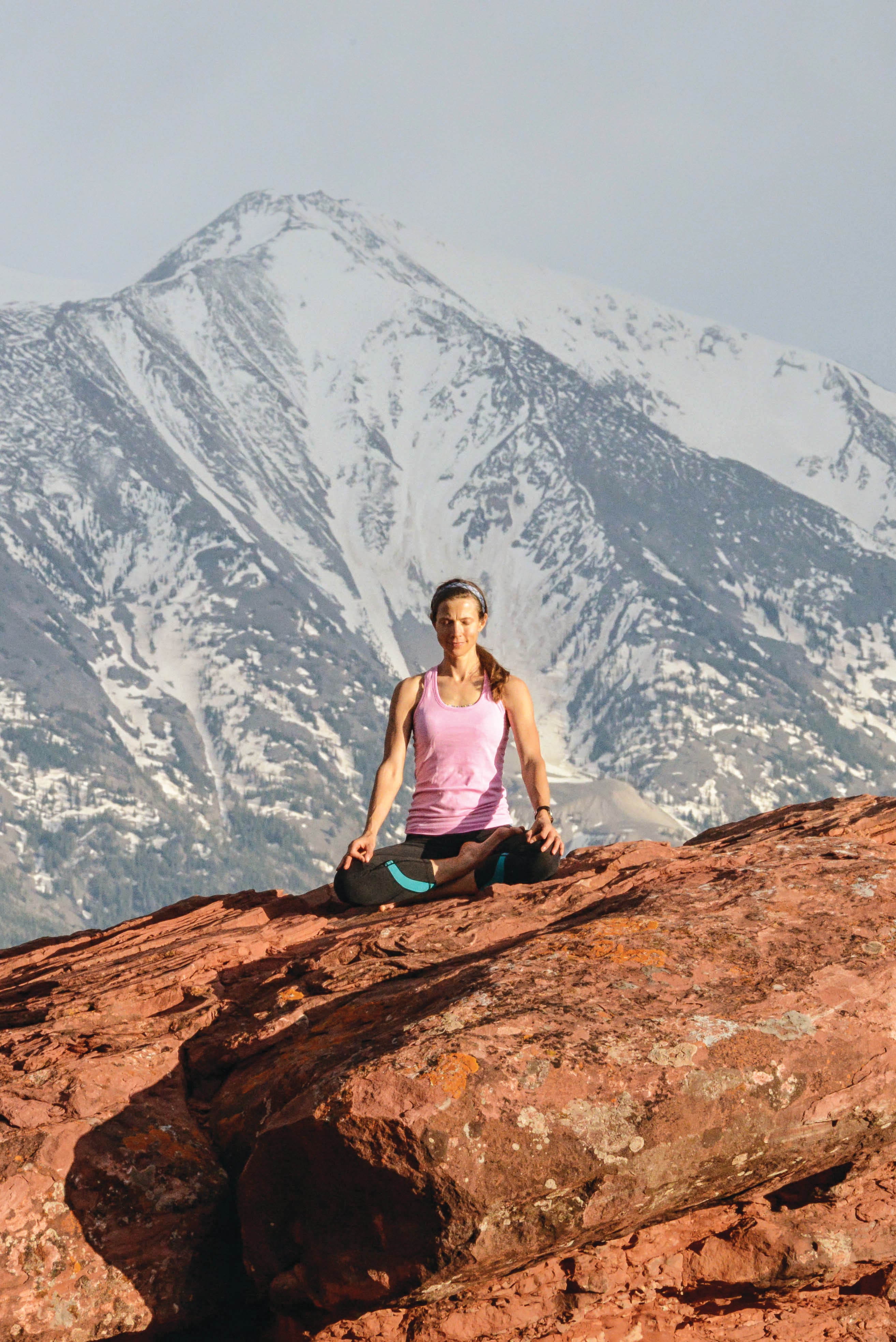How To Run Mindfully

The coronavirus pandemic’s global social and economic fallout hit my travel company like a tsunami. As governments started shutting down airports, schools and businesses around the world in early March, cancellations for our spring trail-running and wellness retreats came pouring in. My personal fear and anxiety for my family and community was compounded by the immense, sudden financial loss taking place within my small company. I felt paralyzed by fear, emotionally drained and struggled to make decisions or ask for help.
I was experiencing what I’ve learned is an “amygdala hijack;” an extreme stress response in which a primitive part of the brain called the amygdala takes over, making higher brain functions—like rational thought—really hard. Amygdala hijack is part of the well-known “fight-or-flight” or stress response, characterized by increased blood pressure, rapid, shallow breathing and a surge in stress hormones like cortisol and adrenaline. Such a state is meant to be momentary, to help one deal with an immediate threat. But in the age of Covid-19, it was hitting me almost daily.
So I turned to my most reliable stress- alleviating practice—mindful running, a practice I had embraced years earlier during another particularly stressful time in my life. It improved my healthy so well (and made me a better runner) that it became the framework of our running and wellness retreats. It’s also easy to incorporate into any running practice anywhere, even while running circles in your backyard.
In essence, this practices combines mindfulness with running to deactivate a stress response (including an amygdala hijack) so you can feel calm and relaxed, a state in which your blood pressure, heart rate and digestive functioning return to normal and hormones rebalance.
LET IT GO
Last week, during an especially anxiety-filled day, I began my run with what felt like a bowling ball in my stomach. My whole body was heavy and my legs felt sluggish. I was awkward, off-balance and lacked any rhythm or flow.
I focused on breathing deeply and feeling the breath move in and out of my lungs. I thought about expanding my chest with each breath cycle, driving back with my elbows to keep my hands wide and maintain a tall posture. Eventually, my breath synchronized with each footstep and I found a familiar and soothing rhythm.
With each minute, I felt a tiny bit lighter, as though the bowling ball was dissolving. By the run’s end, I felt 10 pounds lighter.
You can do the same to release what’s weighing you down, too. Scan your body for points of discomfort, then breathe into those areas of tension. Are your shoulders tense? Relax your arms. Are your hands clenched? Shake them out. Consciously releasing tension is a powerful way to lower the stress response.
Honor what you’re feeling right now rather than insisting that you shouldn’t be so tired, you shouldn’t be so anxious, you should be more productive and other put-downs. Because it’s human nature to focus on what isn’t working, self-compassion is a vital aspect of any mindfulness practice.

FOCUS ON WHY
With so many races, retreats, camps, relays and run- club events cancelled, now is a great opportunity to experience how mindful running lets you tap into an intrinsic motivation source that doesn’t rely on having an external goal. Why do you run? What is most important you right now?
Knowing your values can help you form an intention for your running during this especially challenging time. An intention differs from a goal in that it’s a declaration of how you intend to be rather than what you plan to achieve as a runner.
“My ‘why’ is feeling those few moments when I am actually present in the moment with my breath and stride, and that peace and calm after a run no matter how crappy I felt physically or emotionally beforehand,” says ultrarunner Kim Manning, of Harrisonville, Missouri. “That ‘why’ can be fleeting at times and refraining from being self-critical —which can totally kill the motivation to start a run—is definitely a work in progress.”
BE COMPASSIONATE
Being intentional is also a way to honor what you’re feeling right now rather than insisting that you shouldn’t be so tired, you shouldn’t be so anxious, you should be more productive and other put-downs. Because it’s human nature to focus on what isn’t working, self-compassion is a vital aspect of any mindfulness practice.
“When confronted with life challenges, people often get so lost in problem-solving mode that they do not pause to consider how hard it is in the moment,” says self-compassion researcher Dr. Kristin Neff, Associate Professor of Human Development and Culture, Educational Psychology Department at the University of Texas. “Mindfulness of our negative thoughts and feelings means that we do not become ‘overidentified’ with them, getting caught up and swept away by our aversive reactions. Rather than confusing our negative self-concepts with our actual selves, we can recognize that our thoughts and feelings are just that—thoughts and feelings— helping us to drop our unquestioning belief in the storyline of our inadequate, worthless selves.”
Releasing yourself from expectations (and the pressure to perform to a certain level) is just as important as the aerobic exercise itself for lowering stress.
BOOST YOUR IMMUNITY
Periods of sustained stress, as many of us are experiencing now, are not ideal times to increase your training load through more miles or faster intervals. Research has shown that intense or long workouts when you’re already feeling stressed, overwhelmed or drained only put you at increased risk of illness and injury.
Conversely, running as a mindful self-care practice has been shown to reinforce your immune system. “Your body does a better job fighting off illness and healing wounds when it’s not under stress,” reports health writer Tara Parker-Pope for the New York Times.
Practicing mindfulness techniques like controlled breathing, physical relaxation, expansive posture and mental focus on a mantra or empowering thoughts turns your daily run into the ultimate immune-boosting, stress-reducing activity. And none of it requires a phone, a watch or GPS-enabled app. All it does require is your open curiosity, presence and self-acceptance. return to normal and hormones rebalance.
Elinor Fish is the founder of Run Wild Retreats + Wellness, a travel company for runners, and the Healthy Runners Community, an online space for runners to develop their mindful running practice for health and wellness.